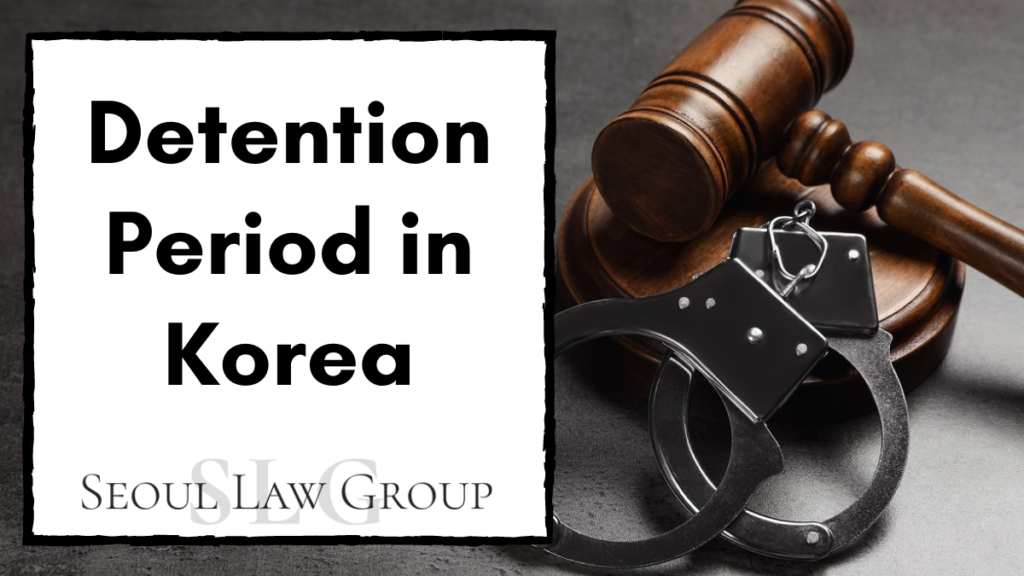Once you got arrested, the prosecutor or police can hold you in custody for up to 48 hours to interrogate you (Criminal Procedure Act, Article 200-2(5)). Of course, not every prosecutor or police would hold you for full 48 hours, especially when you are cooperative, and you have a proper address and phone number. But you should aware that they CAN hold you for 48 hours if they want to.

If the prosecutor or police want to hold you for more than 48 hours, they need a “warrant for detention” issued by the court. Once the judge receives a request to issue the warrant, they would hold a hearing right that day or the next day to examine you (Article 201-2(1)) to decide whether they would issue the warrant or not. If the judge decides to issue the warrant, oh no, you’d better begin to like the detention center, because now you might stay there for a long time.
The pre-trial detention period is like this:
- The police can detain you up to 10 days. (Article 202)
- The police would eventually send your case to the prosecutor, then the prosecutor can detain you up to 10 days, again. (Article 203) The prosecutor must decide whether they would officially charge you or not during this period.
- If the prosecutor couldn’t decide and needs to hold you for longer, they can request the judge for extension. If the judge grants the extension, the detention period can be extended for up to 10 days, AGAIN. (Article 205)
So, you can technically be detained for 30 days (= 10 days + 10 days + 10 days) at the longest, even if you are not officially charged yet.
If you are officially charged, now you are the “defendant,” and your trial would soon begin. If the judge decides that you are needed to be detained during the trial, they should issue another “warrant for detention” by the due process of the law (Article 73). Now THIS warrant is the most fearsome of all, because the detention period is very long.
The detention period for a defendant is like this:
- The original detention period is two months. Please note that it’s not “up to two months.” It’s just two months, period. (Article 92(1))
- If the trial is still not over, and the judge decides to detain you for longer, the detention period can be renewed for two times, by two months each. (Article 92(2))
So, you can technically be detained for six months (= two months + two months + two months) at the longest, and this only applies for the first trial. If you get a ruling, you appeal, and your cases moves up to the appellate court, this detention period starts all over again, with a bonus.
The detention period for a defendant during the trial of appeal is like this:
- The original detention period is two months. (Article 92(1))
- If the trial is still not over, and the judge decides to detain you for longer, the detention period can be renewed for two times, by two months each. (Article 92(2))
- If the appellate court needs to hold an additional hearing for the examination on the evidence requested by the defendant or his defense attorney, the detention period can be renewed for the third time. (Article 92(2))
So, you can technically be detained for eight months (= two months + two months + two months + two months) at the longest during the trial of appeal.
Of course, being detained for this long would be a very rare case, since the trial usually doesn’t go on for so long unless it’s an unusually difficult case to decide.


Just wanna tell that this is very helpful, Thanks for taking your time to write this.
We appreciate your gracious words, and we remain committed to continuous improvement. If you ever have any legal inquiries in the future, please do not hesitate to contact us at info@seoullawgroup.com. We are here to assist you with any questions or concerns you may have . Thanks you for your support.
You actually make it appear so easy together with your presentation however I to find this matter to be really one thing which I feel I’d never understand. It sort of feels too complicated and extremely huge for me. I am having a look forward on your subsequent submit, I will try to get the grasp of it!
Thank you for your kind words. If you require any assistance with your legal matters, please do not hesitate to reach out to us via email at info@seoullawgroup.com. We are here to assist you.